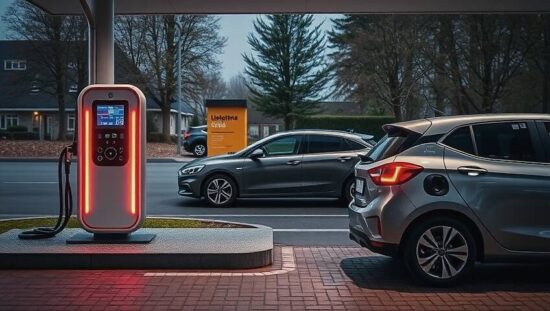The President of the Allgemeinen Deutschen Automobil-Clubs (ADAC), Christian Reinicke, has proposed making price information at public charging stations for electric vehicles more visible, similar to the way prices are displayed at gas stations. “We urgently need a comparability of prices, just like we know it when filling up” Reinicke told the Funke-Mediengruppe newspapers.
There is no apparent reason why this is not already the case, according to Reinicke. He specifically demands that the price of electricity should be visible at the charging point, so that electric vehicle drivers would also take the opportunity to charge their cars when the price is low.
The ADAC President is generally calling for more reliability in the prices of public charging stations. However, he still sees significant uncertainty in the current situation. “The price of electricity for charging is much too high and will likely not decrease” Reinicke said. “The government must do everything to make the prices of charging electricity more affordable for consumers.”
According to Reinicke, a market transparency office, similar to the one at the Federal Cartel Office that provides information on fuel prices, could help. This would allow consumers to easily compare prices and would automatically lead to a competition among providers and lower prices.
A recent analysis by the comparison portal Verivox found that the cost of charging an electric vehicle at a public charging station in the first half of 2024 was up to 79% higher than the cost of electricity at a home charging point. The average household electricity price was 35.96 cents per kilowatt-hour, while the average price at public charging stations was 54.25 cents per kilowatt-hour for normal charging and 64.44 cents per kilowatt-hour for fast charging.
The ADAC President is urging for faster progress in the expansion of the charging network, but also recognizes that this is not always possible. While the expansion along highways is advancing, Reinicke says that there are still major problems in multi-family housing buildings, where residents are sometimes charged 50 to 75 euros per month to have the option to charge their cars, in addition to the electricity costs. “This simply does not add up” he said. “Consumers will not buy an electric vehicle just for the sake of the environment if the purchase price and operation are still uncertain and expensive.”
In Germany, the number of electric vehicle registrations plummeted last year, partly due to the government’s decision to end the subsidy program at the end of 2023/2024 due to budget gaps. ADAC President Reinicke strongly criticized this decision, saying, “Reliability and trust in political action are important. And then to simply cancel a purchase incentive over the weekend was a severe mistake. This must not happen again.” Instead, the government must create a clear, planable and predictable environment for electric mobility to enter the market.
Reinicke is rejecting proposals from party election programs, such as a charging incentive or a tax advantage for buying an electric vehicle, saying, “If I don’t have the money, I can’t also promise tax benefits that I might not be able to hold or have to cancel again.” The government must ensure that the system functions sustainably, he said, which means creating reliable charging infrastructure in the field, as well as reliability in prices.





